Films with theme "Histoire de France", sorted by revenue
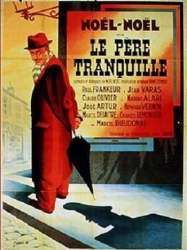
Mr. Orchid (1946)
, 1h35Directed by Noël-Noël, René Clément
Origin France
Genres Drama, War, Comedy-drama
Themes Histoire de France, L'Occupation allemande en France
Actors Noël-Noël, Nadine Alari, Maurice Chevit, Marcel Delaître, Howard Vernon, Paul Frankeur
En France pendant la Seconde Guerre mondiale, sous l'occupation allemande, Édouard Martin qui a toute l'apparence d'un père tranquille, est un chef important de la résistance à l'insu de sa famille. Il est secondé par Simon et Pelletier qui est secrètement amoureux de sa fille Monique. Celle-ci découvre les activités de son père et voit naître son amour pour Pelletier. Alors que se prépare une action sur l'usine voisine, le jeune Pierre Martin s'enfuit de la maison pour rejoindre le maquis. Pour éloigner sa famille et les voisins du bombardement de l'usine, Édouard Martin organise les fiançailles de Pelletier et de sa fille en ville, ce qui alerte la police allemande qui l'arrête. Blessé mais sauvé par les maquisards, le père tranquille est reconnu avec fierté par son fils.
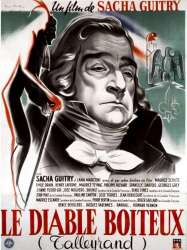
The Devil Who Limped (1948)
, 2h5Directed by Sacha Guitry
Origin France
Genres Drama, Biography, Historical
Themes Political films, Films based on plays, Histoire de France, French Revolution films
Actors Sacha Guitry, Lana Marconi, Henry Laverne, Jeanne Fusier-Gir, Jean Debucourt, Howard Vernon
Il s'agit de la biographie filmée du prince de Talleyrand, évêque d'Autun, qui servit la France de l'Ancien Régime jusqu'à la Monarchie de Juillet en passant par le Directoire, le Consulat, le Premier Empire et la Restauration.
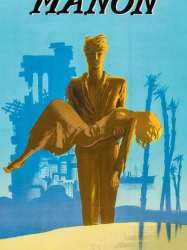
Manon (1949)
, 1h40Directed by Henri-Georges Clouzot
Origin France
Genres Drama, Thriller, Adventure, Crime, Romance
Themes Political films, Histoire de France, L'Occupation allemande en France
Actors Cécile Aubry, Michel Auclair, Serge Reggiani, Gabrielle Dorziat, Andrex, Raymond Souplex
Clouzot updates the setting to World War II, making the story about a French Resistance fighter who rescues a woman from villagers convinced she is a Nazi collaborator.
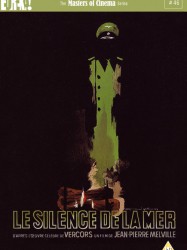
The Silence of the Sea (1949)
, 1h26Directed by Jean-Pierre Melville
Origin France
Genres Drama, War, Romance
Themes Political films, Histoire de France, L'Occupation allemande en France
Actors Howard Vernon, Nicole Stéphane, Jean-Marie Robain, Georges Patrix, Claude Vernier
Un homme d'une soixantaine d'années demeure avec sa nièce dans une maison du Dauphiné, dans la France occupée pendant la Seconde Guerre mondiale. La Kommandantur envoie un officier allemand loger chez eux, en zone libre. Le père de cet officier, qui avait survécu, avait lui connu la défaite de l'Allemagne face à la France, durant la Première Guerre mondiale.

The Elusive Pimpernel (1950)
, 1h49Directed by Michael Powell, Emeric Pressburger
Origin United-kingdom
Genres Drama, Adventure, Historical, Romance
Themes Political films, Histoire de France, French Revolution films
Actors David Niven, Margaret Leighton, Jack Hawkins, Cyril Cusack, Robert Coote, Arlette Marchal
During the French Revolution, the Scarlet Pimpernel (David Niven), who is really Sir Percy Blakeney in disguise, risks his life to rescue French noblemen from the guillotine and take them across the English Channel to safety. As cover, Sir Percy poses as a fop at Court, and curries favour with the Prince of Wales (Jack Hawkins) by providing advice about fashion, but secretly he leads The League, a group of noblemen with similar views.

Milady and the Musketeers (1952)
, 1h28Directed by Vittorio Cottafavi
Origin France
Genres Drama, Action, Adventure, Historical
Themes Histoire de France
Actors Rossano Brazzi, Yvette Lebon, Armando Francioli, Maria Grazia Francia, Jean-Roger Caussimon, Massimo Serato
Un homme est condamné à 10 ans de prison pour un vol commis par sa maîtresse.
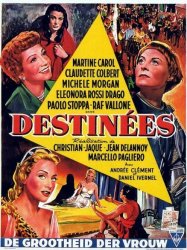
Daughters of Destiny (1954)
, 1h42Directed by Christian-Jaque, Jean Delannoy, Marcello Pagliero
Origin France
Genres Drama, Comedy
Themes Jeanne d'Arc, Histoire de France
Actors Claudette Colbert, Michèle Morgan, Martine Carol, Mirko Ellis, Nerio Bernardi, Gérard Buhr
In this trilogy of stories, the episode "Elizabeth" is about an American war-widow who goes to Italy where her husband was in WW II. The episode "Jeanne" tells the life of Jeanne d'Arc. The episode "Lysistrata" is about Athenian wives, an adaptation of the Greek play.

Joan of Arc at the Stake (1954)
, 1h16Directed by Roberto Rossellini
Genres Drama, Historical
Themes Films about religion, Jeanne d'Arc, Histoire de France
Actors Ingrid Bergman, Tullio Carminati
The film takes place mostly in a surrealistic fantasy around the time of the execution of Joan of Arc. Joan of Arc, played by Ingrid Bergman, is being burned alive for heresy. In a kind of dream state, she departs from her body and looks back upon her life. She begins this journey depressed and demoralized. However, a priest appears to help guide her. First, he shows her those who accused her in the guise of animal characters, in order to show her their true nature. Then, he shows her the good that she has performed for people. In the end, she is proud of what she has done and is ready to face the flames.
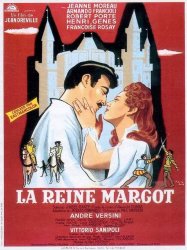
Queen Margot (1954)
, 1h33Directed by Jean Dréville
Origin France
Genres Drama, Historical
Themes Politique, Political films, Histoire de France, Films about royalty
Actors Jeanne Moreau, Louis de Funès, Armando Francioli, Henri Génès, Françoise Rosay, Robert Porte
La vie à la cour et à Paris autour du massacre de la Saint-Barthélemy en août 1572.

A Man Escaped (1956)
, 1h35Directed by Robert Bresson
Origin France
Genres Drama, War, Thriller, Documentary, Historical
Themes French war films, Prison films, Political films, Évasion, Films about capital punishment, Histoire de France, L'Occupation allemande en France
Actors François Leterrier, Roland Monod, Maurice Beerblock, Jacques Ertaud, Roger Planchon
After the establishing shot of Montluc prison, but before the opening credits, the camera rests on a plaque commemorating the 7,000 prisoners who died at the hands of the Nazis.
 , 1h50
, 1h50Directed by Jean Delannoy
Origin France
Genres Drama, Historical
Themes Politique, Marie-Antoinette, Political films, Histoire de France, French Revolution films, Films about royalty
Actors Michèle Morgan, Richard Todd, Jacques Morel, Marina Berti, Jacques Dufilho, Aimé Clariond
Le film porte une vision des évènements de 1789-1793 et de leurs conséquences avec une bienveillante compassion pour la reine (Michèle Morgan), sensible, superbe dans sa splendeur et vulnérable dans son intimité, déchirée entre sa fidélité au roi (Jacques Morel) et sa passion pour Fersen (Richard Todd).
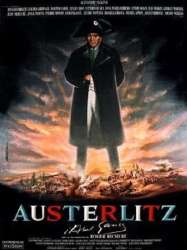
The Battle of Austerlitz (1960)
, 2h46Directed by Abel Gance
Origin France
Genres Drama, War, Historical
Themes French war films, Political films, Histoire de France, Napoleonic Wars films, French Revolution films
Actors Pierre Mondy, Martine Carol, Claudia Cardinale, Leslie Caron, Elvire Popesco, Georges Marchal
The first half of this film covers Napoleon's coronation as Emperor and political manoeuvrings while the second half covers the actual battle, where he beat both Austrian and Russian forces in his drive eastward.
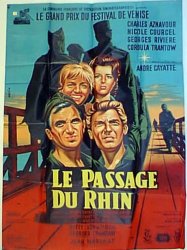
Tomorrow Is My Turn (1960)
, 2h5Directed by André Cayatte
Origin Italie
Genres Drama, War, Romance
Themes Political films, Histoire de France, L'Occupation allemande en France
Actors Charles Aznavour, Nicole Courcel, Georges Rivière, Cordula Trantow, Georges Chamarat, Jean Marchat
The film tells the story of two French soldiers in the aftermath of the German invasion of France who become forced labourers on a German farm under the Service du travail obligatoire programme (STO), but become involved in the lives of their captors.
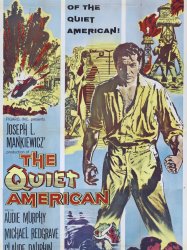
The Quiet American (1958)
, 2hDirected by Joseph L. Mankiewicz, Bernard Vorhaus
Origin USA
Genres Drama, War, Thriller, Romance
Themes French war films, La colonisation française, Films about writers, Films about journalists, Politique, La guerre d'Indochine, Political films, Histoire de France
Actors Audie Murphy, Michael Redgrave, Claude Dauphin, Giorgia Moll, Bruce Cabot, Yoko Tani
In Saigon in 1952, as Vietnamese insurgents are delivering major strikes against the French colonial rulers, an innocent and enigmatic young American economist (Audie Murphy), who is working for an international aid organization, gets caught between the Communists and the colonialists as he tries to win the "hearts and minds" of the Vietnamese people. By promising marriage, he steals away a young Vietnamese woman (Giorgia Moll) from an embittered and cynical English newspaperman (Michael Redgrave), who retaliates by spreading the word that the American is actually covertly selling arms to the anti-Communists.
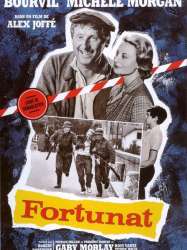
Fortunate (1960)
, 2h1Directed by Alex Joffé
Genres Comedy, Comedy-drama, Romance
Themes Histoire de France, L'Occupation allemande en France
Actors André Bourvil, Rosy Varte, Michèle Morgan, Teddy Bilis, Frédéric Mitterrand, Patrick Millow
At the time of the occupation of France, the destiny joins together the poacher Fortunat, honest guy somewhat related to drink and Juliette, elegant woman accompanied by her two children: Pierre and Maurice. Miss Massillon, a helpful teacher, tries to help Juliette who is sought by the Nazis since her husband, a chief of resistance, was stopped. Juliette and her children must gain the free zone to take refuge in Toulouse. For that it is necessary for them to cross the line of demarcation. It is Fortunat which is charged to lead in sure place the two children and their mother. Close links will link Fortunat and Juliette. A scene of film implies clearly that they have a sexual relationship at least once. But the release occurs and Juliette finds her husband. Fortunat sets out again then towards its destiny of solitary man.
 Connection
Connection